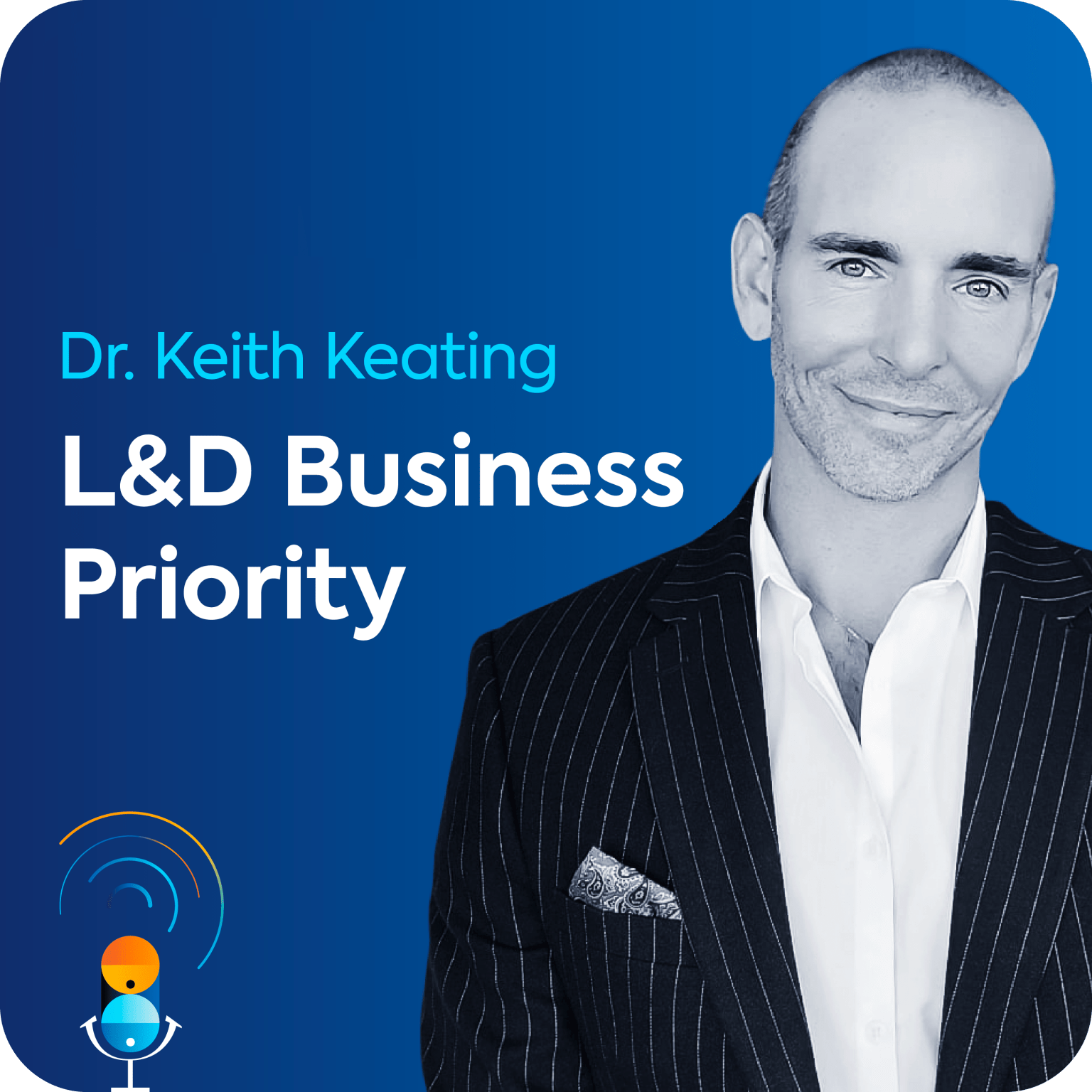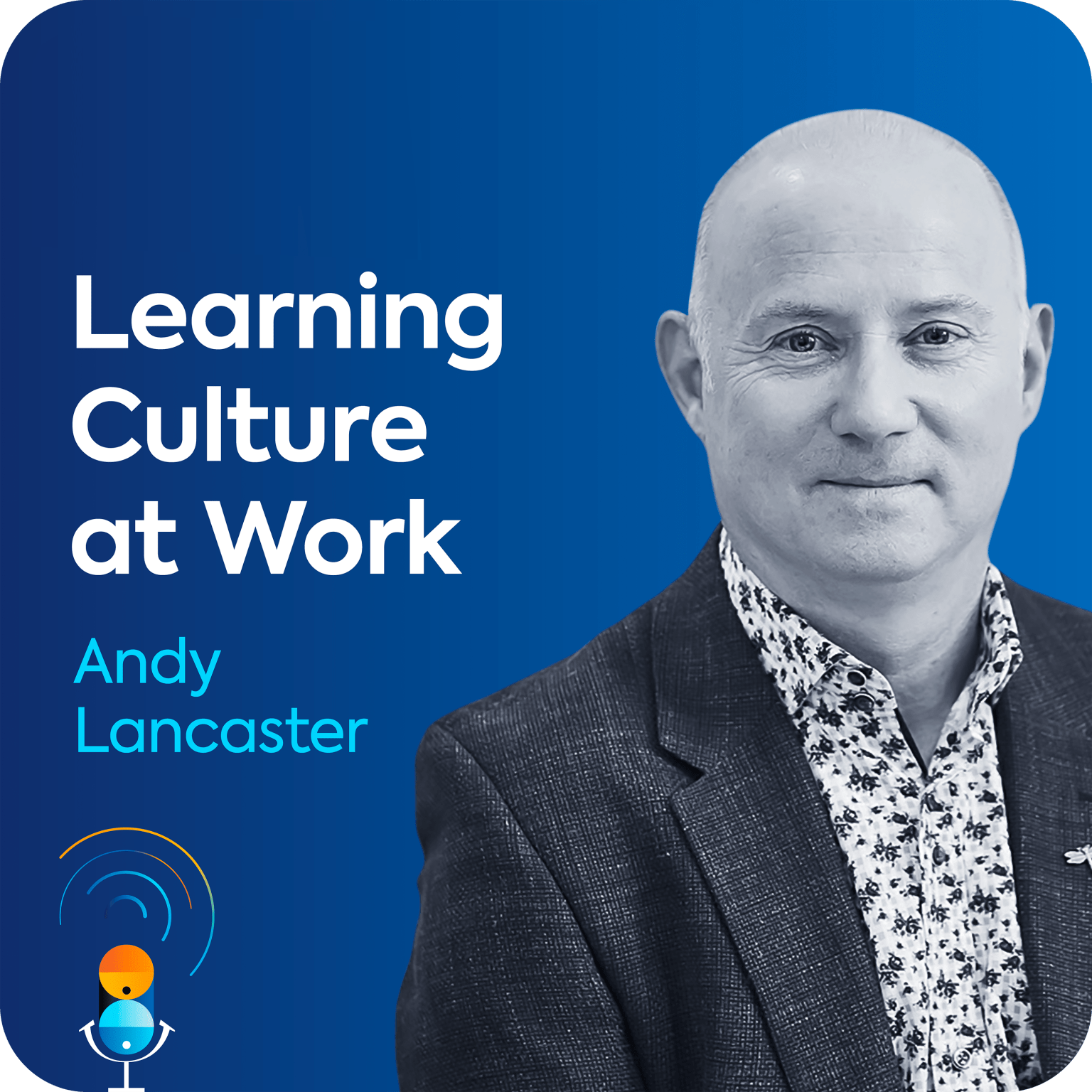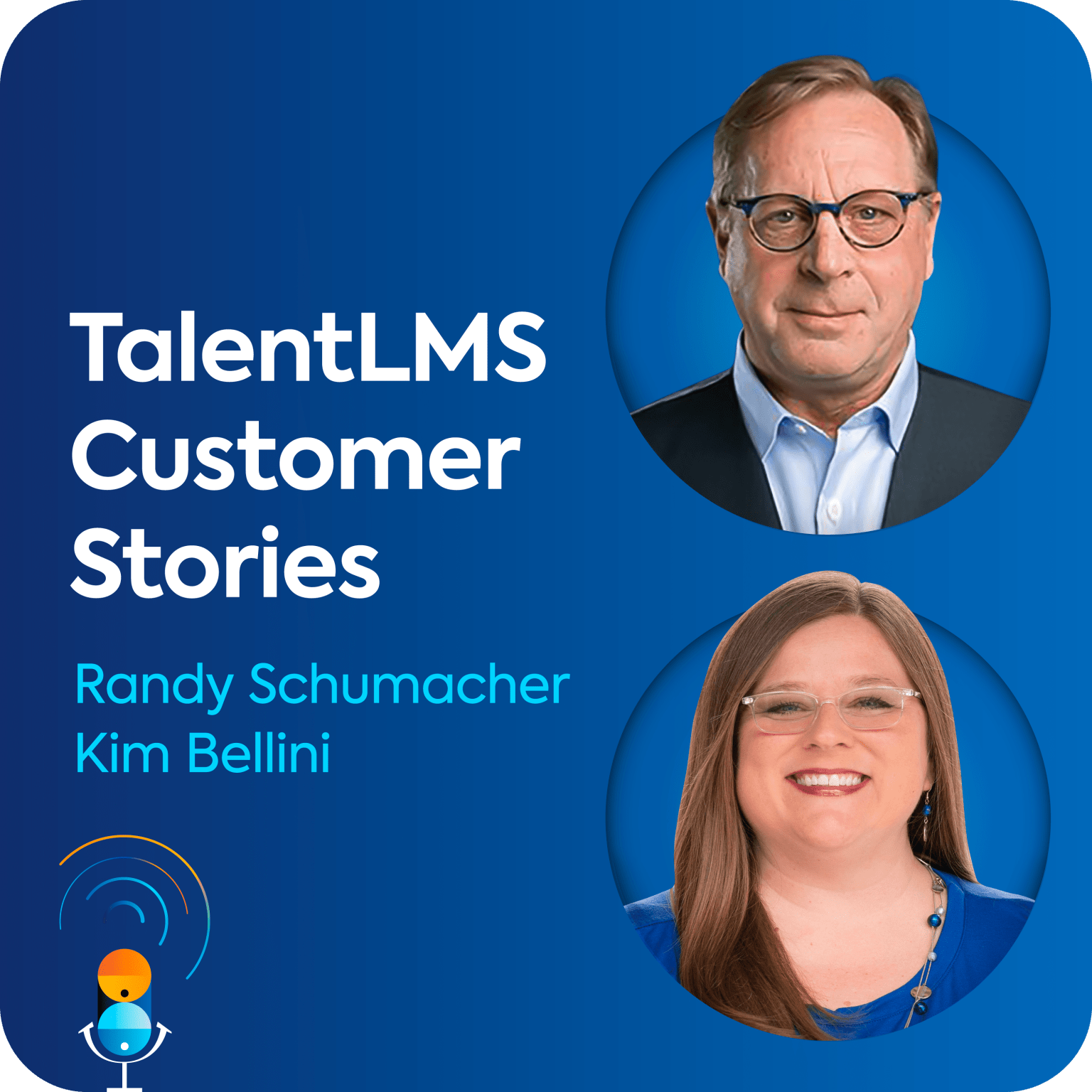Duration: 26 minutes
Season 2
Episode 12
The future of workplace training in 2025
The future of workplace training is here—so how can L&D pros prep for new challenges on the horizon? Brent Skinner, future of work expert, joins to reveal what to expect in the new year and beyond. Informed by the past, we’ll explore learning in the flow of work, how to unify silos, and why in the age of breakneck technology, age-old human skills are more in demand than ever.
Bonus: key insights and cross-generational divides from TalentLMS’s annual training benchmark report.

Key takeaways:
Learning is everywhere; it’s not a silo. Workplace learning has evolved beyond being a standalone activity. It’s tied into every aspect of the employee experience, from onboarding to daily tasks. This makes training a natural part of the workflow.
AI and psychometrics are the future of personalization. Organizations must leverage AI and psychometrics to create self-evolving skills ontologies. This enables tailored learning paths that align with individual employees’ needs and career aspirations.
Soft skills are now “human skills”. Automation takes over more operational tasks. So, the focus shifts to human skills, such as leadership, conflict resolution, and creativity. These are vital for building a competitive and resilient workforce.
Employee wellness is cultural, not cosmetic. Meaning, true employee wellness goes beyond yoga sessions. Or financial planning resources. It’s focused on cultivating an authentic, integrated approach to wellbeing deeply rooted in the company culture.
Organizations must leave behind outdated, compliance-driven training models. They must step up their game and address the challenges of fast technological advancements. Investing in dynamic, personalized, and forward-thinking L&D strategies is no longer optional. It’s essential.

Brent Skinner
About our guest:
Brent Skinner is an accomplished subject matter expert in human capital management. Previously host of the #HRTechChat video podcast, he is former director and principal analyst of the HCM technology practice at 3Sixty Insights. In the press and as a speaker at industry events, Brent is a frequent voice on HCM-related topics.
Drawing on additional background as former technology editor for “HRO Today” and as an industry analyst at Nucleus Research several years ago, Brent enjoys exploring and discussing the #futureofwork.
Share episode
Want more resources on this topic?

8 Growth Mindset Examples and Ways to Develop It

The TalentLMS 2024 Annual L&D Benchmark Report

30 Top Soft Skills Examples to Master in 2025
More episodes we think you’ll love

How can L&D overcome the 3 biggest challenges facing companies today? Why’s L&D failing to get approval from the C-suite? Dr. Keith Keating, the award-winning author of “The Trusted Learning Advisor” joins us to answer these questions.
Plus, we cover how to create a culture where L&D’s value isn’t just a number, and the critical importance of positioning yourself one step ahead of tech trends.
Go to episode
A strong learning culture fuels knowledge sharing and personal development. But how? Andy Lancaster, CLO of Reimagine People Development and award-winning author, helps us uncover the path to creating a workplace where employees are inspired to own their growth journey.
Go to episode
Excessive employee turnover, looming deadlines, and tight budgets. Common business challenges that great L&D programs can tame. In this special episode, we hear first-hand from training trailblazers Kim Bellini and Randy Schumacher, both TalentLMS Training Excellence Awards recipients.
We cover the unique ways that L&D can be your business’ biggest champion, learn their secrets to an effective training program, and uncover how they go about proving L&D’s true potential to the C-suite.
Go to episode
Never miss an episode! Get every new drop right in your inbox
By clicking the Subscribe button, you accept and consent to receive the type of content mentioned above. Please review the TalentLMS Privacy Policy for further information.
Full Episode Transcript
[00:00:00] Host: Welcome to Keep It Simple, a podcast where we’re challenging business and leadership experts to cut through the noise of the corporate world and get to the bottom of what makes the workplace actually work. I’m your host, Mina Vogia. Keep It Simple is brought to you by [00:00:30] TalentLMS, the training platform built for success and designed with simplicity in mind.
[00:00:36] Together, let’s uncomplicate what makes a winning workplace. You can find out more at talentlms.com.
[00:00:49] On today’s episode,
[00:00:51] Brent Skinner: Learning is no longer a standalone thing. We can still talk about it as a silo, just as a signpost so we [00:01:00] understand what needs to be addressed. But it’s really, we’ve really gotten to this point where it weaves into everything.
[00:01:08] Host: What does 2025 hold for the world of L&D? For the final episode of this season, we’re joined by Brent Skinner, an HCM expert and future of work enthusiast.
[00:01:19] We’ll be talking about everything from the trends disrupting the ways we train to the rise of blended workforces and what it all means for the L&D professionals of tomorrow. [00:01:30] Stay with us.
[00:01:40] Brent, thank you so much for taking the time to be with us today. I’m really looking forward to a chat. How are you doing?
[00:01:46] Brent Skinner: I’m doing great. Thank you very much for inviting me. I’m looking forward to our discussion today. Very excited to be on this podcast with you.
[00:01:55] Host: So Brent, today’s chat is going to be all about the future of work.
[00:01:59] We’re really looking [00:02:00] forward to the year ahead, 2025, and we’ll be thinking about what trends, changes, and challenges the world of L&D and HR can expect. But before we really get into that, I’d like to get your take on the past year. How have you seen things shift as an HCM expert and were there any big surprises or trends that you hadn’t expected?
[00:02:22] Brent Skinner: Yeah, that’s a really good question. And I just like to start this off by saying, I think we are already in the future of [00:02:30] work, not to be too cheesy, but I mean. And I didn’t come up with that saying, other people have said it too, but I think we’re there, you know, we’re, we’re, we’re, and there is a future of work ahead of us that that’s very sort of halcyon and almost, you know, u-utopian, and I think we can get to a lot of it.
[00:02:50] Some of it might be a little bridge too far. Maybe, but I think we’re on the path to a better, a better world of work. And I think that’s what everybody is really looking [00:03:00] for when they think about the future of work. Sort of this, this aggregate macro conversation we’re having, but when you talk about the technology for it to happen and what’s been happening in the market, I think we are already starting to get into the future of work.
[00:03:15] When you talk to small businesses that are just getting up and running and they’re trying to figure out their HR operations and get them under control, you’ll talk about talent management or the silos of talent management, performance management, succession planning, [00:03:30] compensation management, this sort of stuff, right.
[00:03:32] And learning. But I think one of the things that’s really starting to happen finally is at least for organizations that are mature in their HR operations, mature in their HCM, their human capital management. We’re finally kind of moving away from those, the siloed thinking. Learning is no longer a standalone thing.
[00:03:53] We can still talk about it as a silo, just as a signpost. So we understand what. What needs to be [00:04:00] addressed, but it’s really, we’ve really gotten to this point where it, where it weaves into everything, you know, there’s learning that happens when you onboard as an employee, as a new employee, there’s onboarding that happens when you move into a new role, there’s onboarding that happens on a, you know, maybe weekly, monthly, even possibly daily basis, because you need to be able to do Α, B, C, or D it’s not this thing where, okay, I’m doing my job.
[00:04:24] Okay. Now I’m learning. It’s kind of all happening together. And so [00:04:30] those are some of my thoughts about where learning is going, like the future of work and what’s happened this year. And I think we’re, we’re off to the races as you could see. I think you could look at 2024 as sort of before. And after, before 2024, we were still, maybe we still had that lingering learning siloed thinking, but after 2024 and moving forward, I think we finally, we’re finally putting that in the past.
[00:04:59] Host: [00:05:00] So in a way, 2024 was a very pivotal year for L&D and HR professionals. You mentioned something about de-siloing traditional distinct departments, how can organizations be well-prepared for this transformation?
[00:05:16] Brent Skinner: So, first of all, let’s just talk a little bit more about that de-siloing, right? If you really go down the rabbit hole with silos.
[00:05:24] and human capital management, it’s, it’s actually quite fascinating, and the rabbit hole [00:05:30] never seems to end. Right. So at one point, I don’t know when or how it happened or, or what, but we can kind of hypothesize as to why or rationalize as to what, right. At some point, somebody thought, okay, here are the different things we do when we’re managing the employment of people.
[00:05:49] Let’s call them different things so that we have a sort of a lexicon. Right. We have a way, a nomenclature. We have a way to talk about it and understand what we’re [00:06:00] discussing. Right. That was really interesting. And so of course that happened before the advent of, before business software, I think really started to take off.
[00:06:08] It was at the time, probably intuitive and probably lent itself to the limitations of the technology in, in their nascence at that time. Right? But all these different types of software developed emerged. Addressing these different silos. So they are all developed and created with these different silos in [00:06:30] mind.
[00:06:30] And part of it was because of the way we communicated, how we had to communicate about the management of the employment of people. And I think the other part of it was, you know, just incidentally happened to be that the technology, I don’t think we have the ability to kind of create sort of a, an overall technology business software that can handle it all.
[00:06:51] We’re talking about the Paleolithic era versus today, 21st century, probably, I’d say maybe, you know, the, the nineties, mid-nineties, [00:07:00] so that persists. So we had two things that were going on. We had the technology that was really kind of limited and could only kind of address human capital management in a siloed way.
[00:07:12] And we had the way we talked about it sort of contributing to that too. And those, those two factors, there was a confluence of those and it kind of reached a fever pitch, a tempest, if you will. I say maybe about 10 years ago when people really started talking about, you know, what, we got to kind of break free from this stuff, but now we have.
[00:07:30] You know, there’s a lot of automation that happened and a lot of sort of cross-training. We have a lot of end to end HCM software solutions, all this kind of stuff where everything kind of blends. The stage was set for a blending of the various silos of activity so that they would actually, they would reflect how their day-to-day work plays out and how it needs to be managed.
[00:07:53] Right? And so we’ve finally gotten to this point now of being able to actually not [00:08:00] address the employment of the management of people anymore in a siloed way. Listen to podcasts like these and understand that, that if you’re addressing things in a siloed way, now is the time to let go of any sort of emotional sunk costs that you might have.
[00:08:18] And some of that, right, but really go in there and look, okay, is this going to serve me? Two years from now, three years from now, also [00:08:30] explore artificial intelligence. I know everybody’s talking about artificial intelligence, but there are some things that artificial intelligence will do that, that’ll enable you or, or will, um, amplify your ability to weave these things together and to sort of break down the imaginary partitions.
[00:08:47] And real partitions between the silos, right? Look into psychometrics to steal Oldsmobile’s old tagline. These, these aren’t your father’s psychometrics. This isn’t Myers-Briggs. There’s some really [00:09:00] powerful stuff out there that, that will help you understand your workforce, understand your skills ontologies, and then combined with AI, you can, you can start developing self-evolving skills ontologies.
[00:09:13] So those are some of my thoughts around there.
[00:09:20] Host: We’ll get back to our chat with Brent in just a second. But first, we wanted to outline what we predict will be the biggest L&D challenges of 2025. [00:09:30] First up, time. 39 percent of employees feel they don’t have enough to simply fit training into their workday. One solution is microlearning. Break it down to bite-sized modules you can tackle in just a few minutes.
[00:09:46] Another idea? Integrate training into daily workflows, so learning happens naturally while you work. Next, motivation. Almost a third of staff surveyed say they find it hard to maintain motivation [00:10:00] Or even see the relevance of training. So, make it relevant and engaging. Gamify the experience with badges or leaderboards.
[00:10:09] And don’t forget to connect the dots between training and career growth. When people see the payoff, they’ll be more invested. Finally, keep ahead of the curve. As tech advances, skills are becoming outdated fast. So make sure you keep an eye on upskilling. Use the power of AI platforms to [00:10:30] keep content fresh, and don’t be afraid to assess the gaps in your workforce.
[00:10:37] So I would love to talk about TalentLMS’s most recent survey. It’s an annual survey into the state of L&D. And one of the interesting things that we found is that a third of staff members report a lack of social skills in the workplace. Whilst the amount of training employees received in interpersonal skills has declined since 2022.[00:11:00]
[00:11:00] Why do you think there is this gap for what might be an in-demand aspect for employees versus what is actually being offered?
[00:11:09] Brent Skinner: So that’s interesting. That perplexes me as to why there’s been a decline. Generation Z, I think they are the digital native generation. I remember when I got my first cell phone.
[00:11:21] Now I, it’s tough to, to really fathom what it was like before then. But I remember, I remember previously not [00:11:30] having a cell phone, but this generation has no concept of that. It’s. been part of their existence and since they were born. And I, I’ve read some studies around and some, some articles around this, you know, when we, social media first came onto the scene about 15 years ago or so, everyone thought, Oh, this is great.
[00:11:50] Right. You know, almost this, all this communication has resulted in more problems, but it’s near very narrowly specifically. It has stunted their growth in terms of their [00:12:00] interpersonal skills. It’s actually kind of, it’s, It’s actually almost scary to think about it. You know, I almost don’t want to think about it too much, right?
[00:12:07] Because what does it mean to train people post de facto or whatever the term is, way back, way after they’re 20 plus years old and things they should have been just sort of absorbing and learning by osmosis when they were much younger, 5, 8, 10, 12, whatever, right? Plus he had COVID, which further stunted that when they were in [00:12:30] high school, the ones that are in work now, when they were in high school, that, you know, that would, that just for that probably exacerbated matters.
[00:12:36] So makes a lot of sense. That that’s, that that’s an issue. So it’s actually quite alarming that training in it has decreased. You got to wonder why is it because, um, our organization’s compensating by, by deploying platforms where they can communicate, where Gen Z can, can [00:13:00] maybe communicate in the ways that they are more comfortable or more familiar.
[00:13:04] So there’s all sorts of solutions out there that might. Service prosthetics or help people to kind of, or, or just circumvent real genuine or, uh, old school, uh, face-to-face interactions. So those are some of my thoughts there, but I wonder how, I haven’t seen any of it. I’ve not designed any of it. I’m not, that’s not, that’s outside of my wheelhouse, but I wonder how effective is [00:13:30] training like a learning module on interpersonal communication?
[00:13:36] Like how effective is it really? How are you, are you ever going to be effective? That’s not a knock again, a dig against the people developing these courses, right? But how effective is that really going to be taking sort of a, uh, a three-day module or a, or a, or a three, two-hour session module around interpersonal communication?
[00:13:59] That to [00:14:00] me just seems just pales in comparison to developing your interpersonal communication in a much more organic way. So I think maybe this is all hypothesis, conjecture, speculation, but I’m wondering whether organizations are saying, you know, yeah, that’s not the route to go, let’s just, let’s meet them where they are and adapt our communication with our communications, with our workforce based on their best.
[00:14:26] You know, where they, how they are best at communicating.
[00:14:30] Host: If I’m honest, I think we do need to sort of take that step towards them, but I actually think there is a lot of value in teaching interpersonal skills through training courses because a lot of times, you know, you walk into a professional setting, you’re fresh out of university, and you don’t know how to bring up conflict.
[00:14:51] You don’t know how to talk to your manager, how to, resolve something with somebody else. Unfortunately, there isn’t all that much team building, even at a university level. So when you have to work with someone on a day-to-day basis, when you have to be part of a team, [00:15:09] and I think it’s the least that an organization can do is to provide that training on how to be more effective when it comes to that.
[00:15:19] Brent Skinner: You make a good point. Because it’s important. You know, it got me thinking, maybe this ability to communicate in a very human way, I mean, this is something we developed [00:15:30] over a million years, right?
[00:15:33] Perhaps it’s innate, maybe it just needs to be awakened, you know, maybe they just need an opportunity to, to be thrown into it so they can figure it out and develop that innate capability they have that it’s just been laying dormant. Maybe that’s it. That’s an entire podcast episode in its own right, isn’t it?
[00:15:53] Host: Yes. Um, now soft skills are of course becoming ever more important as AI [00:16:00] tech is rolled out in just about every aspect of our work lives. But over half of the employees we surveyed said that there were no clear guidelines in their companies when it comes to the usage of AI. Do you think organizations are doing enough to keep up with the rise of tech?
[00:16:18] Brent Skinner: Hmm. I think the safe answer is always that organizations are not doing enough to keep up with the rise of tech. That’s, that, that’s the safe answer. That’s not to say that they aren’t thinking about [00:16:30] it and they aren’t trying. It’s just they need to step up their game. This gets into a question that’s really interesting that I had some discussions around it, uh, several years ago with a team member at an organization I’m no longer with and he isn’t either.
[00:16:45] But it was just this idea of, You know, as AI continues to evolve, does a lot of this, these sort of rote operational jobs, these jobs that are [00:17:00] automatable as a, you know, the concept of automation is expanding. You know, there are jobs around in the financial space where people sort of figure out, okay, who qualifies for a loan, right?
[00:17:13] There’s all this work that AI can do now. And so it’s becoming ever more important for humans. People, real people to sort of embrace and develop their soft skills. And we all have them. We all have them or what’s [00:17:30] called them human skills. I think that’s a better way of putting it as opposed to soft skills, right?
[00:17:35] You know, conflict resolution, ability to lead all these sorts of things or to solve problems, right? There will be some business models that you’ll be able to run them entirely just with AI, but there are others that you won’t be able to. Look at recruiting as an example, right? A lot of the yeomans work are just that, that sourcing and just going out there, getting the word out, finding the right match.
[00:17:59] A [00:18:00] lot of that’s going to be handled by AI, the vast majority of it, but you’ll still need that person. You know, let’s be honest, there’ll be people who will latch on to this and others that will sort of resist and, you know, they’ll suffer the consequences, unfortunately, right? But the folks that smart people will understand that they need to expand their game from a human skills standpoint, but in terms of keeping up with AI,
[00:18:25] and making it clear to their employees how they should be doing AI, [00:18:30] companies need to be doing a lot more around that. There is some movement in the market though, where we have companies that are sort of recognizing this and providing solutions where organizations can understand which sort of agentic AI solutions
[00:18:45] are the most effective, versus least or helping organizations augment employees productivity and which ones aren’t to help organizations give them some visibility into understanding that. I think that organizations, employers should [00:19:00] go out there and explore those and avail themselves of them.
[00:19:03] Host: Now, personalization is also something that has never been easier to do when developing content for learners and providing learning paths.
[00:19:12] In fact, 79 percent of people valued personalized learning. Do you have any practical tips for companies that can help them provide this level of uniqueness for each of their employees?
[00:19:25] Brent Skinner: My advice to employers is that they should be working with a learning company, a [00:19:30] learning provider that really understands the new landscape.
[00:19:32] It’s not just about having a learning management system to track training. Right. If you’re still sort of looking at, at learning as just training to stay compliant with various things, uh, maybe you have a bunch of forklift operators, you need to make sure that they’re up to date with their certification for that, or you work a lot of RNs and you have to make sure that they’re, uh, licensed and all this sort of stuff, that’s all important.
[00:19:57] Compliance is never going to go away. Training for [00:20:00] compliance will never go away, but, you need to be invested in a partner that has dynamic content, right? So that they understand this. This goes back to the previous question around soft, human skills, right? Understanding your workforce and
[00:20:17] understanding which human skills are most apt and most able to learn next and which skills they’d be most willing and most excited [00:20:30] to apply next. Because this gets into employer culture is, you know, when you have as many people as possible doing what they like the most and are best at doing.
[00:20:45] Uh, in terms of their human skills, you’re going to have, you’ve laid the groundwork, the strongest foundation possible, I think at least a pillar of it, of a strong, uh, vibrant employer culture, a [00:21:00] retentive one where people are going to stay. And so they’re also going to be attractive or you’ll attract the best talent from elsewhere. And of course that’s the lifeblood of competitiveness.
[00:21:10] Host: And something which we can take away as a positive from the past few years is the growing awareness for employees’ well-being. This seems to be continuing, especially with the new generation of workers coming into the workforce, a generation who are motivated by job satisfaction and work-life balance [00:21:30] more than ever before.
[00:21:31] It’s no surprise, then, that almost two-thirds of the employees we surveyed See non-related work training as an essential part of training. So, how can companies support employee well-being through learning?
[00:21:46] Brent Skinner: Well, that’s interesting. Non-work related training. That might be around, you know, financial wellness, for example, right?
[00:21:54] These sorts of things. So understanding as, as an, and this gets into employee well [00:22:00] being as, as, as a practice, which is, which it is. Okay. You know, and there are organizations that are at various states of maturity in that. But, you know, we all have heard of sort of the Employee Assistance Program. That’s sort of the conventional, traditional, the EAP, which is sort of the tried and true.
[00:22:18] It almost, you know, predates the idea of employee wellness. But if you’re an organization and you have an EAP, well, that’s just a starting point, right? You, that’s, that’s [00:22:30] sort of table stakes. Well, you’d better have an EAP, but there are so many other things that you should be doing. And it’s also not about, Oh, uh, sort of, I’ve heard it.
[00:22:38] There’s a term for it, but sort of blanketing. People, Oh, we’re going to offer, offer yoga classes, or we’re going to give them access to this, that, or the other for helping them, you know, repair their credit or giving them, you know, access to a, to, to legal advice, this sort of thing. That’s, that’s not employee wellness.
[00:22:56] It’s more about integrating it into your culture. [00:23:00] To be honest, I think that organizations that have strong employer cultures, they probably are most apt to have some sort of a real meaningful, authentic, genuine, organically developed employee wellness approach to employee wellness. And so it’ll have all these, these different aspects of it, but it’ll be more, it’ll be more, um, genuine.
[00:23:27] Host: Great. And [00:23:30] now, before I ask you one of my favorite questions, the final question that we have on this podcast, I want to ask you one more thing. If you had to prioritize one area of learning for companies to focus on in 2025, what would it be and why?
[00:23:46] Brent Skinner: Well, I think we’ve sort of answered this already, but I’ll just put, I’ll Uh, underscore it, put an exclamation point on it.
[00:23:55] You need to be investing in your employees, human skills, their soft skills. [00:24:00] Um, AI, like we said, AI is, is evolving at a breakneck pace. It’s doing a lot of the work that used to be done by humans and AI becoming a tool for writing was not first, was not. On my bingo card, right? I thought that that would be, uh, something that would come along a lot later.
[00:24:21] And as, as a person who’s been a business writer for many years that, you know, I won’t, I won’t lie. I was a little bit scared. Then I used the LLMs and I realized that, you know,[00:24:30] they’re not quite ready for prime time and won’t be for a while. It’s not just lower level jobs or blue-collar jobs, it’s, it’s everybody you need to be investing in, uh, helping them develop their human skills.
[00:24:42] Value comes from the people in your organization, future value. And so, you know, you’re maximizing present revenue, right? By employing the AI to do some of these things, right? But you’re really investing in future value and competitiveness by paying attention to your people. And yeah, so I [00:25:00] think the investment in, in human skills should be.
[00:25:03] Should be priority number one, and you know, there should be a moonshot Manhattan project level proportions sort of effort to invest in people’s human skills so we can develop our people.
[00:25:17] Host: And now for my favorite question. So it’s also the biggest challenge, I think, on this podcast. In one sentence, what do you think needs to be left behind in [00:25:30] 2024 when it comes to L&D and the workplace?
[00:25:35] Brent Skinner: We need to leave a one dimensional training mindset for compliance and learning behind. Thank you for keeping me to one sentence, I’ve barraged you with myriad multiple sentences.
[00:25:48] Host: And we love it, that’s why we wanted you on the show.
[00:25:51] Brent Skinner: Thank you so much for having me on the podcast, I appreciate it.
[00:25:54] Host: Thank you so much.
[00:26:01] Thanks for tuning in. You can find Keep It Simple on all podcast platforms. Be sure to subscribe so you don’t miss an episode. This season was brought to you by TalentLMS, the training platform built for success and designed with simplicity in mind. For further resources on today’s topic, visit talentlms.com/podcast
Train your people. Measure results. Drive growth.
TalentLMS gives you the tools to supercharge every step of your training.

